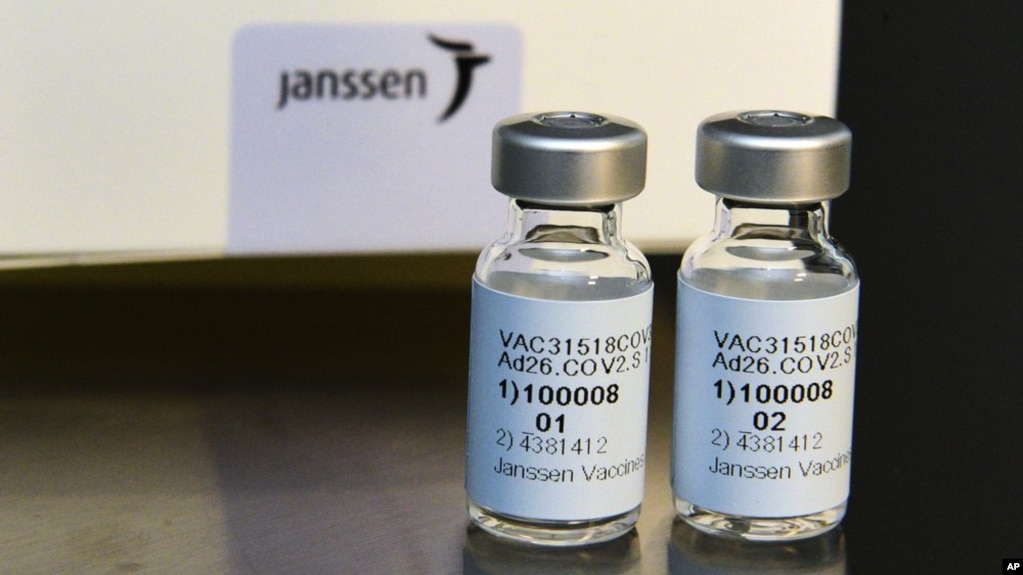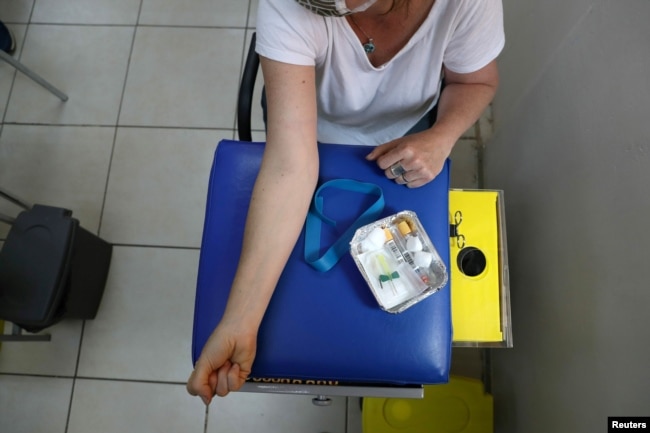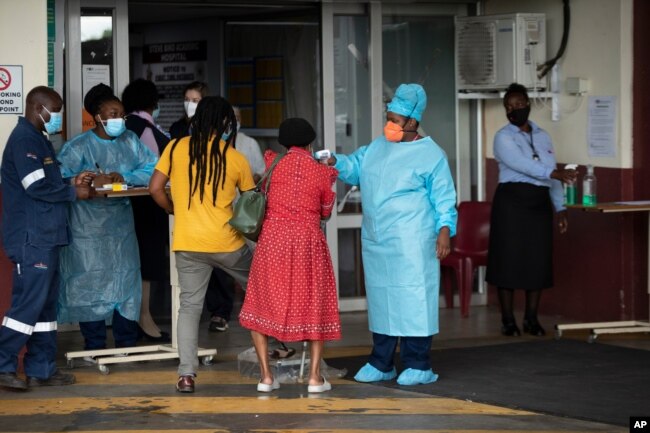However, scientists have reported that antibodies from a small number of people who had recovered from COVID-19 were less effective against the variant from South Africa.
この発言には、改めて、、、なるほど、、、
silver lining となるも、道のりは遠いですね。
※☝過去のブログでご確認くださいね。
今日も昨日に引き続き、robot dancingに癒されてます。。。
下記発音に気を付けて、
efficacy rate of 72 percent:有効率72%
【éfikəsi】
Le'ts get started!!
- J&Jのワンショットワクチン
- 米国では有効だが、南アフリカでは有効ではない
- J&J One-Shot Vaccine Effective in US, Less so in South Africa
- Words in This Story
J&Jのワンショットワクチン
米国では有効だが、南アフリカでは有効ではない
J&J One-Shot Vaccine Effective in US, Less so in South Africa
January 29, 2021
アメリカの製薬会社ジョンソン・エンド・ジョンソンは金曜日、世界中で行われた大規模な試験で、同社のワンショットワクチンがCOVID-19を予防したと発表しました。しかし、このワクチンは、心配な変異型が新たな感染症を引き起こしている南アフリカでは効果が低かったのです。
The Johnson & Johnson,ジョンソン・エンド・ジョンソン(J&J)の試験では、約44,000人のボランティアが参加しました。同社によると、このワクチンは米国で最も効果があったとのことで、有効率は72%でした。ラテンアメリカでは、有効率は66%でした。J&Jの報告によると、南アフリカではワクチンの有効率が最も低く、57%ででした。
木曜日には、別のアメリカのNovavax社が、英国のボランティアの間で自社のCOVID-19ワクチン候補の有効率が89%であったことを報告しました。しかし、南アフリカのボランティアグループでは49%にまで低下しました。
ファイザー・バイオンテック社とモデナ社の2ショットワクチンは、大規模な試験でCOVID-19に対してほぼ95%の有効性が認められた。しかし、これらの試験は主に米国で実施されたものであり、英国、ブラジル、南アフリカから新しいコロナウイルスの変異型が広まる前に実施されたものです。
J&Jの最高科学責任者であるDr.Paul Stoffelsポール・ストフェルス 博士。同氏は、世界保健機関(WHO)がパンデミック時のワクチン接種には1回接種が最適と考えていることを指摘しています。ストフェルス氏はまた、このワクチンは重度のCOVID-19の予防に85%の効果があるという試験結果も指摘しています。これは、”医療システムや地域社会にかかる膨大な負担を和らげる希望を与えてくれる”とストフェルス氏は述べています。
Dr.Anthony Fauciアンソニー・ファウチ博士は、米国政府のトップ感染症専門家である。彼はジョンソン及びジョンソンの調査が”非常に励みになる”と言います。
金曜日のコロナウイルスのブリーフィングでは、ファウチ氏は、変異型を "私たちのすべてのためのモーニングコール "と呼びます。彼は、より多くのコロナウイルスの変異型を防ぐ最善の方法は、"可能な限り多くの人にワクチンを接種することである "と付け加えます。
J&Jは、このワクチンの緊急使用のために2月上旬にU.S. Food and Drug Administration米国食品医薬品局の許可を得る予定であると述べています。米国食品医薬品局は、緊急時の使用を承認するためには、50%以上の有効率を必要としています。
COVID-19の変異型
他のウイルスと同様に、COVID-19の原因となるコロナウイルスであるSARS-CoV-2は、絶えず変化しています。新しい変異型が現れては消えていくこともあります。また、新しい変異型が出現し、多くの国に広がっていくこともあります。
医学専門家は特に、イギリス、ブラジル、南アフリカ由来の3つのSARS-CoV-2変異型を懸念しています。米国政府のCenters for Disease Control and Prevention 疾病対策予防センター(CDC)によると、これらの3つの変異型は他の変異型よりも容易かつ迅速に拡散するように見えるといいます。
イギリスでは、2020年9月にB.1.1.7として知られるコロナウイルスの変異型が初めて確認されました。それは瞬く間に国内に広がり、現在ではヨーロッパ、米国、カナダにまで広がっています。
P.1と呼ばれるコロナウイルスの変異型は、1月に日本の東京近郊の空港で検査を受けたブラジルからの旅行者4人から初めて確認されました。このコロナウイルスは、ドイツ、韓国、米国を含む多くの国に広がっています。
南アフリカでは、B.1.351と呼ばれる別の変異型が10月初旬に出現しました。それ以来、オーストラリア、韓国、ドイツを含む30カ国以上に広がっています。木曜日、アメリカの保健当局は、南アフリカでのB.1.351の出現を報告しました。サウスカロライナ州で2つのケースを確認しました。患者は互いに関連性がなく、どちらも最近旅行したことがありませんでした。専門家によると、このことは、コミュニティの広がりは、まだ確認されていないキャリアから始まったことを示唆しているといいます。
現時点では、米国保健機関の専門家は、新しいコロナウイルスの変異型がより重篤な病気や死亡リスクの増加を引き起こすという証拠はないと述べています。
しかし、科学者たちは、COVID-19から回復した少数の人々の抗体は、南アフリカからの変異型に対してあまり効果がなかったと報告しています。現在、J&JとNovavaxノバックスの試験結果は、現在のワクチンが南アフリカの変異型に対して他のワクチンよりも効果が低い可能性があることを確認しています。
モデナ社とファイザー社はそれ以来、新しい変異型に対して承認されたワクチンを強化させる試験していると発表しています。
J&J One-Shot Vaccine Effective in US, Less so in South Africa
 FILE - Sept. 2020 photo provided by Johnson & Johnson shows the investigational Janssen COVID-19 vaccine. The American company says its one-shot vaccine prevented COVID-19 in a large trial. But it was less effective against a variant in South Africa. (AP)
FILE - Sept. 2020 photo provided by Johnson & Johnson shows the investigational Janssen COVID-19 vaccine. The American company says its one-shot vaccine prevented COVID-19 in a large trial. But it was less effective against a variant in South Africa. (AP)
American drugmaker Johnson & Johnson said Friday that its one-shot vaccine prevented COVID-19 in a large trial around the world. The vaccine, however, was less effective in South Africa where a worrisome variant is causing new infections.
The Johnson & Johnson, or J&J, trial involved almost 44,000 volunteers. The company said the vaccine worked best in the United States with an efficacy rate of 72 percent. In Latin America, efficacy was 66 percent. J&J reported that South Africa saw the lowest efficacy rate of the vaccine, at 57 percent.
On Thursday, another American company, Novavax, reported its own COVID-19 vaccine candidate was 89 percent effective among volunteers in Britain. But the results dropped to 49 percent with a smaller group of volunteers in South Africa.
The two-shot vaccines from Pfizer-BioNTech and Moderna were found to be nearly 95 percent effective against COVID-19 in large trials. Those trials, however, were held mainly in the U.S. And they took place before the spread of the new coronavirus variants from Britain, Brazil and South Africa.
Dr. Paul Stoffels is J&J’s chief scientific officer. He noted that the World Health Organization considers a one-shot treatment to be the best choice to vaccinate people during a pandemic. Stoffels also pointed to the trial’s finding that the vaccine is 85 percent effective in preventing severe COVID-19. This offers “hope of helping ease the huge burden placed on healthcare systems and communities,” he said.
Dr. Anthony Fauci is the U.S. government’s top infectious disease expert. He said the Johnson & Johnson study was “very encouraging.”
At a coronavirus briefing Friday, Fauci called the emerging variants “a wake-up call for all of us.” He added that the best way to prevent more coronavirus variants is by “vaccinating as many people as you possibly can.”
J&J said it will seek U.S. Food and Drug Administration permission in early February for emergency use of the vaccine. The agency requires a 50 percent or better efficacy rate to be approved for emergency use.
COVID-19 variants
Like other viruses, SARS-CoV-2, the coronavirus that causes COVID-19, is continually changing. Sometimes new variants appear and disappear. Other times, new variants appear and spread across many countries.
Medical experts are especially concerned about the three SARS-CoV-2 variants that came from Britain, Brazil and South Africa. The U.S. government’s Centers for Disease Control and Prevention (CDC) says they appear to spread more easily and quickly than other variants.
In Britain, a coronavirus variant known as B.1.1.7 was first recognized in September 2020. It quickly spread throughout the country and now is spreading throughout Europe, the United States and Canada.
The coronavirus variant called P.1 was first identified in four travelers from Brazil who were tested at an airport near Tokyo, Japan in January. It has spread to many countries including Germany, South Korea and the U.S.
In South Africa, another variant called B.1.351 appeared in early October. It has since spread to more than 30 countries including Australia, South Korea and Germany. On Thursday, American health officials reported the appearance of the South African variant in the U.S. They identified two cases in the state of South Carolina. The patients had no links to one another and neither had traveled recently. The experts say this suggests community spread started with a yet unidentified carrier.
At this time, U.S. health agency experts says there is no evidence that new coronavirus variants cause more severe sickness or increased risk of death.
However, scientists have reported that antibodies from a small number of people who had recovered from COVID-19 were less effective against the variant from South Africa. Now, the results from J&J and Novavax trials confirm that current vaccines might be less effective against the South African variant than others.
Both Moderna and Pfizer have since announced they are testing a booster of the approved vaccines against the new variants.
________________________________________________
Words in This Story
variant - n. something (the virus) that is different in some way from others of the same kind
burden - n. something that is difficult to deal with
encouraging - adj. causing hopeful feeling
booster - n. something that helps

